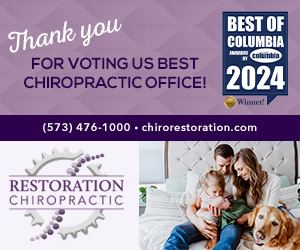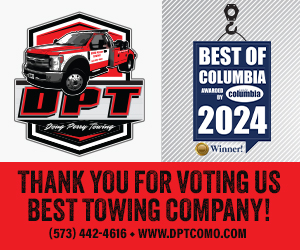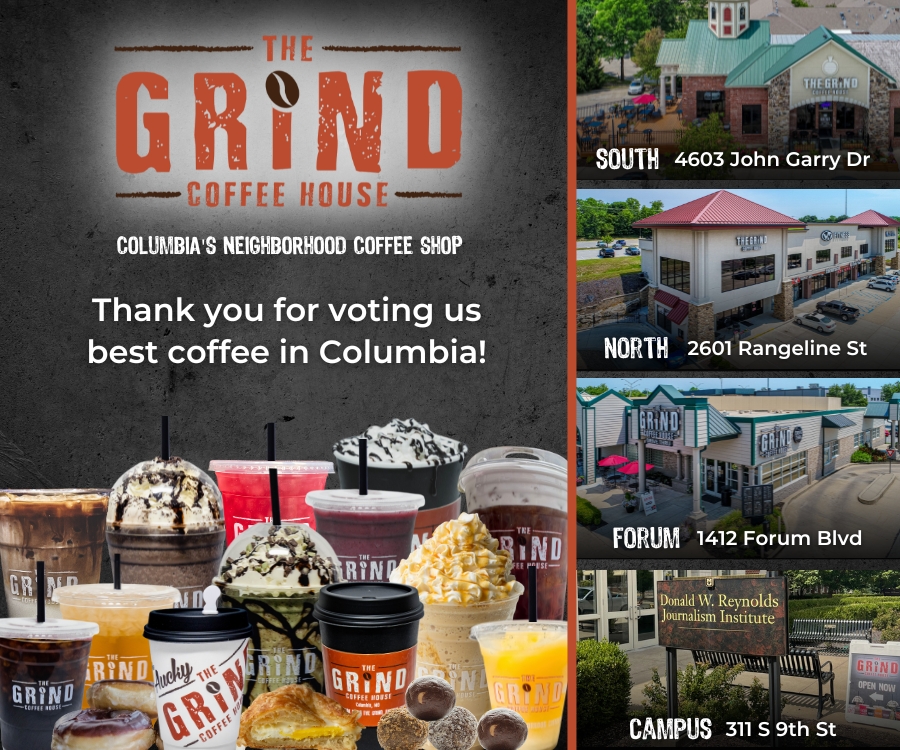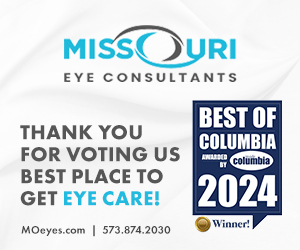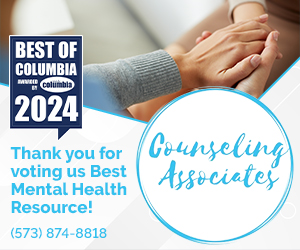While most people know that the University of Missouri is the largest employer in Columbia, participants at the most recent CEO Roundtable took the importance of the education sector a step further. According to the 11 attendees, education is the most vital thing to improving Columbia’s future.
But, the roundtable participants said, education doesn’t only apply to our schools. Venture capitalists and other investors need to be educated on why Columbia is a good choice for their money. Columbians need to be educated about what MU as well as other top employers are inventing and bringing to Columbia’s economy and research sector. High school students need to be educated that college isn’t the only choice for them; trade schools are great options and workers skilled in the trades are desperately needed. Finally, city employees and officials need to be educated more on the struggles that business owners go through, especially when it comes to getting new projects and expansions approved.
Inside Columbia Publisher Emeritus Fred Parry hosted this CEO Roundtable at Zimmer Communications with local business owners, presidents and leaders from education, financial, legal, development and health care industries.
The event was sponsored by The Broadway Hotel; the hotel’s award-winning Chef Jeff Guinn catered the meal that accompanied the conversation.
While attendees ranged across many industries, their answers were surprisingly similar when it came to what Columbia is struggling with and what the path forward should look like. One of those areas is the need for more money being invested into our community.
Venturing Into New Water
One thing that Columbia is lacking when it comes to projects is capital, roundtable attendees said. Perhaps the issue is the difference between startups and partnerships, Dianne Lynch, president of Stephen’s College, suggests. “Stop expecting people to invest in startups or compete in that universe and start thinking about partnerships, where partners bring those extraordinary resources into our community, because you have something to offer them,” Lynch says. “What are those five or six companies in this community that do things extraordinarily well, and how do we take that as a strength and leverage it into strategic outreach to companies that have their own venture capital, and they’re growing and they need to know where to go next.”
Jeff MacLellan, formerly the CEO of Landmark Bank, agrees that ultimately what Columbia needs to develop more projects and brands is capital, but not just any capital. “What we really don’t have is the big bucks,” he says. “I used the word venture capital, because, you know, we’re pretty good at getting companies started and getting them to a certain level. But for example, Beyond Meat couldn’t find funds here, so they went elsewhere. And other communities are benefiting from that.”
One potential solution to attracting venture capital is creating more deals, Susan Hart with Reinhart Construction, says. “We don’t have a lot of venture capitalists looking because we don’t have enough deals coming through.” Hart cites NextGen and the university as potential areas venture capitalists might invest. “The venture capitalists will start to come to us because their $250,000 or their million goes a lot further than on the East and West Coast.”
In order to attract investors, businesses and the university have to market why Columbia is a great choice. That’s one area we are failing, attendees said. “From my vantage point,” Mun Choi says, “The alignment on marketing of activities really starts with the university touting its most compelling attributes.”
“There is so much that we can do as a community if we can come up with a coordinated marketing strategy, “ Choi adds. “I recently learned that Storage Mart was founded in Columbia and I had no idea. We have so many things that we can tout, but that does require us to come together and come up with a collective vision and put resources behind it.”
Transforming Innovation Into Economic Results
Of course, the University of Missouri is the largest employer and is a source of new investments, but sometimes those investments aren’t well-known in the community. Choi says part of that issue is internal. “Wouldn’t it be great if people could talk about things like NextGen as a point of pride?” he says. “But, there are some faculty members that don’t know about this initiative. And so we have to do a better job communicating with our internal audience as well.”
“But,” he continues, “with NextGen, with our athletics program, with local businesses like VU and Equipment Share, we can identify, what are the top five things that make us proud to live and work in a community like this.”
Jonathan Curtright, CEO for MU Health Care, says one area he thinks Columbia isn’t promoting enough is MU and the MU Health Care corporate partnerships. “We are the largest academic partner for Siemens Healthineers,” he says. “We are the number one partner of Cerner and we also just installed a 7 Tesla MR in the NextGen building, the most powerful magnet in the region. We should be highlighting these corporate partnerships in our community’s marketing and communications.”
“The University of Missouri is developing a reputation nationally as a great partner,” Curtright continues. “We’re trying to get more business into Columbia, more innovation that’s going to create some really good paying jobs, and I think we can build off of that.”
Many businesses, including well-established ones and startups, in Columbia have new developments that citizens don’t know about. According to participants, educating them and improving overall communication is one step in the right direction, but we also have to know how to transform those ideas and innovations into benefits the community can tangibly see.
Choi says that ultimately, the university can tip the scales when it comes to the success of Columbia as a whole. “As the largest employer, if the university does well, the community does well,” he says. “But if we don’t, and you saw this in 2016 after 2015, this community was hurting because of the reductions in enrollment and the smaller amount of state support that came through.”
Lynch agrees that we need to leverage the power of the university, but believes that other top employers and innovators in the community are essential, too. “Many of the fasting growing companies in the U.S. are startups that could benefit so much from hearing from people like Greg Steinhoff about how Veterans United has created a people first culture.
“It’s an extraordinary story that we’re not leveraging at all. The university is the core business and the core employer of this community and I believe it will remain that. But I am also a big believer in diversifying revenue streams. I think higher education is going to change dramatically in the next decade, and I think that we have about 10 years to figure out how this city is going to leverage what else it does extraordinary well, and then build the narrative around it.”
As higher education evolves, so will elementary through high schools. But, evolution can only happen if schools are already in a good place.
School Systems Not Making The Grades

Unfortunately, most schools in the country have had major hurdles over the past year and a half with the pandemic, but Columbia Public Schools’ issues go further than just that. According to Fred Parry, publisher emeritus for Inside Columbia magazine, CPS ranges in the bottom 25% of the state when it comes to the percentage of less advantaged students who reach English and math proficiency. Citing more state data, Parry says in Columbia, 28% of the subgroup students are “proficient” or “advanced” in English skills. For math, that number is only 24%.
Lynch says she believes the new CPS Superintendent Dr. Brian Yearwood may help close this gap. But as someone who has been in education in Columbia for a long time, she says it’s not a new issue. “I think that one of our former superintendents used to talk about Columbia being the tale of two cities,” she says. “There is this whole element of thriving educated that are doing very well. And then there’s a whole population of our city that does not meet that description.”
Phebe LaMar, an attorney with the Smith Lewis Law Firm, believes that within schools in Columbia, the achievement gap is not going to get better anytime soon. “When you start talking about kids who were stuck at home during the pandemic, there were groups of people who tried really hard to make sure that we continued to educate our kids,” she says. “Public education is the greatest equalizer and we’re destroying it as we speak.
“If we don’t find ways to build our public education up, we are going to continue to see the economic disparity grow, the achievement gap grow and we’re going to continue to see all kind of ills for our entire society that we’re not going to undo.”
And vice versa, poverty in the community can affect children in schools, too. Gary Thompson, CEO of Columbia Insurance Group, discussed the lunch program at Blue Ridge Elementary. “One hundred percent of the children there are on free or reduced lunch,” he says. “One hundred percent. There is hunger in that community and around our neighborhood — I mean, there’s a tremendous number of families trying to make a living and raise their kids,” he says.
“The headlines often highlight crime committed by a small number of people, but the vast majority of these families are trying to break the cycle of poverty and just need some guidance and assistance. I don’t think that story is known far and wide in our community.”
While some families in Columbia struggle with finding and keepings jobs and providing enough for their families, many business owners are seeing a starkly different issue: not enough workers.
A Loss Of Labor
“You can have the best of living conditions and the highest paying jobs, but you’re still competing with every place in the world for those workers,” Ed Scavone, president of Central Bank of Boone County, says.
Matt Williams, president of Simmons Bank, says that according to his customers, a shortage of supplies and workers are the two biggest issues right now. “I think we’re headed in the right direction with what they’re doing with Ranken Tech,” he says. “But to me, that was a missed opportunity in the past. We do a great job of higher education here, but every high school student probably doesn’t need to go to higher ed. So we’re making up for lost time, but there’s a lot of work to be done. I mean, it’s hard to get a house built right now.”
Troy Greer, CEO of Boone Health, says he’s seen firsthand the effects of the housing shortage on employee recruiting. He recently tried to bring on a cardiothoracic surgeon who wanted to bring a team with him to Columbia. But, Greer says, his team was having trouble finding housing. “They notified him that they couldn’t make the move right now and so he notified me that he’s not going to come unless his team can come.
“I think it’s very important for us to understand that these pieces work together as a much broader puzzle, and if we don’t solve certain pieces of it, it’s very hard to solve other pieces of it.”
While labor and material shortages certainly add to the housing issue, one area that also may be contributing is approval for projects.
Challenges Within City Government

Attendees cited the difficult work of elected officials in Columbia but wondered if perhaps we’ve gone too far in restricting growth. According to Caleb Colbert, an attorney at the Law Offices of Haden and Colbert, oftentimes the city government is stuck between a rock and a hard place, especially when it comes to new building permits. “It is very difficult for leaders at the city to recognize the value of building new housing or building new commercial development when existing residential neighbors, for example, come in and oppose the project,” he says. “At the end of the day everybody deserves a place to live, everybody deserves a place to work. In order to do that, you have to approve some of these projects.”
LaMar agrees that it can be difficult to get projects approved in Columbia. “When you apply for a plat, you don’t know that you’re going to get it approved,” she says. “You may get turned down twice on a compliant plat, and you can’t build anything on that property without getting it replatted.”
Hart adds that while the developer is waiting on that vote, they’re incurring huge costs. “I think we need to also point out the amount of money that developer has to put out before they even know what they can develop,” Hart says. “It’s a huge risk.”
MacLellan says the issue isn’t getting better as time goes on. “Part of the problem is sales tax revenue, which the city has gone looking for other ways to raise revenue, and they’ve done it with all kinds of costly rules and permits. We need somebody who is action-oriented, accountable and has had to meet payroll and lived in the real world.
“As far as local government leadership criteria, when you’re a businessperson, you compromise every day,” he continues. “You do it with customers. You do with employees. You do it with suppliers. I mean, that’s the nature of the game.”
Of electing officials to affect change, Greer says one missing piece of the puzzle is communication with our citizens. “We’re going to have to be able to tell people in the community what is in it for them, because if we don’t do that, I think you’re going to wind up in the same ineffectual leadership that’s afraid because their job is to get reelected. In an ironic way, business leaders are more permanent than anybody who’s ever elected.
“And so I think that leadership aside, we can’t absconds our responsibility to be there, because an elected official is only as good as the next election cycle.”
As a leader, Mun Choi, president of the University of Missouri, can identify with some of these struggles. “I tell all my leaders: ‘You’re not in a popularity contest. You’re going to make some hard decisions.’ And in the same way, I think the city has to do the same thing. To say ‘no’ to certain things that are not aligned to the vision, but start off by saying, how do I get to a ‘yes’.”
And that of course is one of the biggest takeaways from any CEO Roundtable: trying to get everyone participating — and those not in the room — to collaborate and compromise for the sake of our city and its citizens.
RAPIDFIRE
If you were leading a new Columbia initiative, what’s the first action item?
“We need an outline of a job description for who’s going to lead this effort and what kind of skills are required of that person or persons.”– Jeff MacLellan, formerly with Landmark Bank
“The airport’s new terminal is going to be a game changer from an economic development standpoint for our community.”– Gary Thompson, Columbia Insurance Group
“We need to immediately begin development of more shovel-ready sites.”– Susan Hart, Reinhardt Construction
“Ultimately, we’re a small town. And we struggle with scale. And anything that we can do to partner and share resources with Jefferson City, will create more scale.”- Jonathan Curtright, MU Health System
“We need to prioritize and act. And that first is going to require a group of leadership willing to do that and say the hard things.”– Dianne Lynch, Stephens College
“We have to say why a healthy, well-planned growth rate is crucial for the economic well-being of our entire community.”– Troy Greer, Boone Health
“Fads come and go, priorities change because you have different leaders. But that focus on excellence, if that can be sustained through multiple generations of leaders,
will serve us well.”– Mun Choi, University of Missouri
“The mid-Missouri community needs to work collectively, across our city limits to align the many diverse interests in reaching common goals around workforce development.”– Ed Scavone, Central Bank of Boone County
“We need more folks from the business community to run for elected office. There are ample opportunities to volunteer on boards and commissions and we just need more folks from our organizations to step up and participate on those.”– Caleb Colbert, Law Offices of Haden and Colbert
“Workforce is our major issue right now. We can have all these great ideas, but if we don’t have people to accomplish them, then we’re dead in the water.”– Matt Williams, Simmons Bank
“We need to find ways to reach across the aisle with politics — the way to get our city into a better situation is to find ways to make it purple, not blue and red.”– Phebe LaMar, Smith Lewis Law Firm




